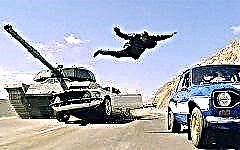

The content of the article:
- A fairy tale is a lie, but there is a hint in it
- Responsible Hollywood
- Superhero effect
- Not a whip, but a carrot
- Criticism of the initiative
The Russian government has seriously turned its attention to the moral aspects of modern cinema. The State Duma has caught the glaring facts of traffic violations, often shown in films. We are not talking about chases embellished with special effects, which you will not find in real life, but about banal situations when the heroes do not wear a seat belt while getting into the car, or transport children not in special chairs.
The Federation Council and the State Duma deputies have already actively advocated drawing up a list of recommendations for filmmakers, which the Ministry of Culture has been instructed to develop with the assistance of the Ministry of Internal Affairs. First Deputy Prime Minister Igor Shuvalov's secretary emphasized that the expected document would be of a recommendatory nature. However, the media has already leaked information that the option of banning those films that will “propagate” traffic rules is not ruled out.
A fairy tale is a lie, but there is a hint in it

Indeed, in Russian cinema, it is not uncommon for a hero to go to work, on a date, to a meeting and at the same time does not fasten his belt, speaks on the phone without using a headset, and does not follow elementary road signs. And such shots can be seen much more often than in American or European films.
It is no secret that what is seen on the screen, including the behavior of the characters, influences the actions of the audience. Although this effect is most pronounced in children, it is not alien to adults either.
The film encourages someone to change their way of life, someone - their image, and someone - to violate law and order. For example, after watching the epic "Fast and Furious" traffic police officers noted a manifold increase in street racing and simply dangerous driving on the streets, leading to injuries.
It turns out that the censorship of the Soviet era was not so wrong, which strictly adjusted cinema, music, and literature to moral dogmas. Thus, the authorities saved both the mental and physical health of their citizens.
Responsible Hollywood

But in the United States, such censorship has been in effect for a long time, carefully monitoring the plots of films and the behavior of heroes. In 1995, a special government commission was even created, whose tasks include monitoring the production of film companies and preventing child injuries. The basis for the organization of such a unit was the analysis of the behavior of movie characters who did not wear helmets while riding motorcycles and bicycles, did not wear a seatbelt while driving, and committed other violations.
The results of this study have resulted in appropriate recommendations for producers, who should carefully prescribe the behavior of their characters. That is, already 20 years ago, the Americans implemented what the Russian authorities are now proposing.
However, a 2009 report at the Centers for Disease and Injury Control and Prevention in Atlanta, USA, showed poor performance. Even despite the censorship, over 5 years of cinematic activity, from 2003 to 2007, only half of the heroes, drivers and passengers fastened their seatbelts during the trip, and motorcyclists and cyclists wore helmets in 25% of cases.
John Eric Tongren, the epidemiologist who compiled this study, cites injuries as the leading cause of infant mortality. He studied nearly seven dozen films, whose audience is predominantly children and adolescents. Fantastic films or animated films were not accepted in the work, only simple, realistic scripts, including comedies, adventures, dramas and family films.
The experts who conducted the study paid special attention to such scenes where people, in the course of certain actions in real life, would receive very serious injuries, some of them life-threatening. However, the filmmakers "rewarded" their characters with only minor bruises.
On the one hand, this is just a movie, where every story is fiction. But on the other hand, such unreliability dulls the young viewers' sense of danger and the instinct of self-preservation, and sometimes - inflames the desire to repeat this or that trick. After all, the screen hero did not have anything for this, - the child will be justified.
Dr. Barbara Gaines, director of the child injury prevention program at one of the American hospitals, is confident that the scenes of falling from a great height, jumping out of a driving car, after which the heroes just shake off the dust and move on, have an extremely negative effect on children. They take what is happening on the screen too literally and as something easily embodied in life.
Superhero effect

The legitimacy of the fears of both Dr. Tongren and Dr. Gaines can be confirmed by the illustrative example of the 40s, when the very first film about Tarzan was released. He immediately became the idol of children all over the world, who dreamed of repeating his tricks and feats. Following the viewing of the film, the level of child injuries rose rapidly in all countries, as every child at least once tried to jump from tree to tree, swing on a chandelier or tie a rope to a balcony.
The latest statistics inspire some optimism: even with the modern level of special effects and the number of blockbusters, movie heroes have become almost twice as accurate and responsible. But doctors still consider this figure to be insufficient for the well-being of children.
In only 35% of all films released on screens, pedestrians cross roads at crossings or at a permissive traffic light. In another 35% of tapes, small children are in the car in the front seat next to the driver, moreover, they are not always wearing a seat belt. In real life, such an irresponsible parent would receive a serious fine.
Not a whip, but a carrot

Vyacheslav Lysakov, First Deputy Chairman of the State Duma Committee on State Construction and Legislation, called the RIA Novosti journalists the exclusion of dangerous scenes from the cinema quite reasonable. He is confident that, unlike punitive actions, such a ban will be of great importance from the point of view of social impact on society. Now it is customary to influence people by the method of educational propaganda, unobtrusive persuasion, and the development of correct stereotypes. Lysakov pays particular attention to the Hollywood practice, in whose films even criminals are now buckling themselves up when getting into the car. In Russian cinematography, practically no one ever performs this simple action.
If the writers and producers think that "law-abiding" behavior will ruin the negative character, they are wrong. The fact that the character is using a telephone headset during the trip will not change the overall storyline, but the benefits for the audience will be very tangible.
The Defense and Security Committee, represented by Franz Klintsevich, has already expressed its active position for the prohibition of deliberate violations of traffic rules that are not justified by the extreme situation in the film. He suggests that the recommendations should be documented and legally correct so that they do not seem frivolous to filmmakers. Klintsevich is sure that television and cinema has the ability to literally encode people for certain behaviors (remember A Clockwork Orange), both good and bad.Therefore, there is no need to specifically teach people to neglect safety and generally accepted rules.
If, according to the script, it is impossible to avoid certain behavior of the hero, which goes beyond the bounds of the law, even this scene can be correctly played. For example, the hero's companion may hint at the need to fasten a belt, or a traffic police officer should be included in the frame, who will indicate life-threatening behavior. Any even a minor character in this situation will serve as a kind of warning inscription on a pack of cigarettes, talking about harm to health.
Criticism of the initiative

The young director Boris Khlebnikov, the author of the films "Koktebel" and "Long Happy Life", has already spoken out against such recommendations, even if they do not have an imperative character. In his interview for Gazeta.Ru, he said that sooner or later any request from the government of our country would still become a categorical ban.
Khlebnikov believes that already modern cinema is as far as possible from real life - it does not show people who smoke and drink alcohol even in small quantities, and prohibits showing drug addiction. If the state, the Ministry of Internal Affairs, the traffic police interfere in the filming process, the movie will lose any meaning at all. If the filmmaker plans to show a reckless hero who lives by his own rules and disregards the laws, then he should not buckle up or transfer grandmothers across the road.
Whether the idea of such “correct” films will cause rejection among filmmakers, whether it will reduce the attendance of films by the public - time and the level of box office cinemas will show.











